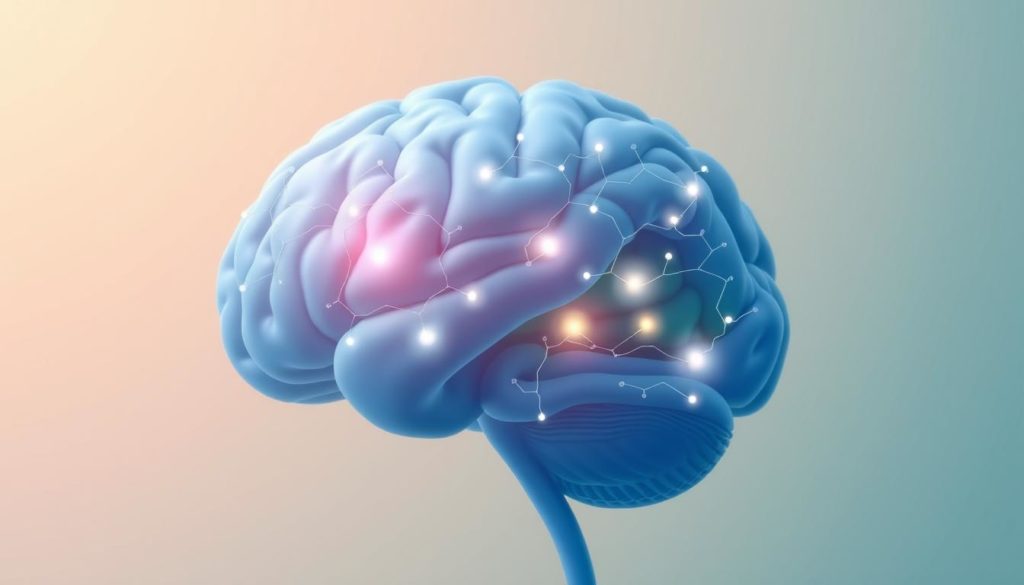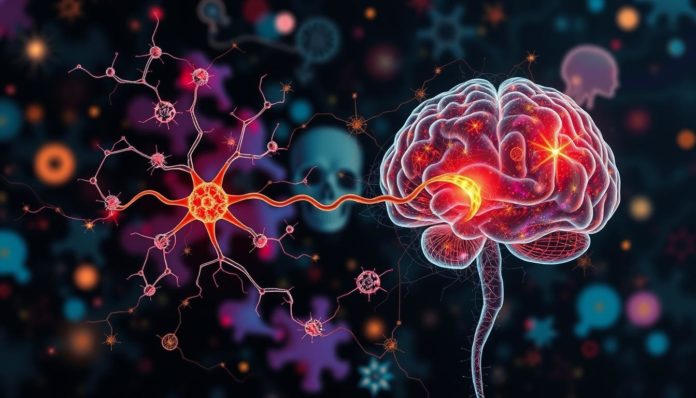Did you know up to 70% of Alzheimer’s patients have gastrointestinal issues? Diarrhea is a common problem among them. This shows the important but often ignored link between Alzheimer’s disease and digestive health. Handling digestive issues like diarrhea is key to improving patients’ well-being.
Alzheimer’s disease affects the brain and can cause other medical issues. Diarrhea might result from medication, diet changes, or infections. It’s critical to diagnose and treat these issues early to help patients live better.
This article explores why Alzheimer’s disease may cause gastrointestinal problems. It also offers advice to prevent diarrhea, aiding caregivers in tackling this difficult part of the disease. We will look at the crucial link between the brain and gut and find out how to manage these symptoms.
Introduction to Digestive Health and Alzheimer’s Disease
Alzheimer’s disease, a progressive neurodegenerative disorder, affects the brain and body, including digestion. It’s crucial to understand how digestive health and Alzheimer’s are linked. This knowledge helps patients and caregivers alike.

Overview of Alzheimer’s Disease
The first signs of Alzheimer’s include memory loss and confusion. Over time, it affects more than just the mind. While experts explore prevention, managing symptoms to improve life quality is key.
Common Gastrointestinal Issues
Digestive issues are common in Alzheimer’s patients. They face indigestion, constipation, and diarrhea. These problems may be due to diet changes, lack of water, medicine side effects, or other conditions. Tackling these issues is crucial for better health.
A diet high in fiber, drinking plenty of water, and staying active helps avoid digestive problems. Getting regular dental care is also important. It helps manage Alzheimer’s symptoms, as dental health affects the brain.
The Brain-Gut Connection
The relationship between the gut and the brain is fascinating. It’s known as the brain-gut axis. This connection is vital for our digestive and cognitive health. It helps us study diseases like Alzheimer’s.

Understanding the Brain-Gut Axis
The brain-gut axis is about how our gut and brain talk to each other. It includes neural, hormonal, and immune signals. This communication means our gut bacteria can change our mood, thoughts, and risk of brain diseases.
Effects on the Nervous System
The impact of the brain-gut axis on the nervous system is huge. Good gut health leads to a healthy brain. This is crucial for preventing diseases that cause cognitive decline.
Research shows gut bacteria can control inflammation linked to Alzheimer’s. They play a role in our immune system, affecting our brain. This shows how important the brain-gut connection is for our nervous system.
Diarrhea and Alzheimer’s Disease
Diarrhea is a big problem for Alzheimer’s patients, affecting their well-being. Alzheimer’s impacts many areas, including the digestive system in dementia patients. This disease can change what they eat, making them prone to digestive issues.
Handling digestive problems in Alzheimer’s requires a proactive and careful plan. Alzheimer’s medications can cause side effects like diarrhea. Talking to healthcare experts is key to manage these issues well.
“The interplay between cognitive decline and digestive health underscores the importance of comprehensive care for Alzheimer’s patients.” — Gastroenterology Today
To lessen the Alzheimer’s effect on digestive health, open talks with caregivers are needed. This helps manage digestive problems better. Knowing the specific symptoms of diarrhea helps in quick action, improving the patient’s life quality.
| Issue | Impact | Management |
|---|---|---|
| Diarrhea Symptoms | Discomfort, dehydration, nutrient loss | Prompt medical attention, hydration, dietary adjustments |
| Alzheimer’s Disease Impact | Cognitive decline, altered eating habits | Regular check-ups, tailored nutrition plans |
| Gastrointestinal Health in Dementia | Digestive issues due to medication | Consultation with health professionals |
| Managing Digestive Issues | Monitoring, timely intervention | Caregiver communication, individualized care |
Common Causes of Diarrhea in Alzheimer’s Patients
It’s crucial to know why Alzheimer’s patients often have diarrhea. We’ll look at the main reasons, like meds, food issues, and bugs.
Medication Side Effects
Medicines can upset the stomach and cause diarrhea in Alzheimer’s folks. It’s tricky treating diarrhea when you have to consider Alzheimer’s meds. Pills for mood or other illnesses might make the belly issues worse.
Dietary Factors
What you eat matters a lot for tummy health. A good or bad diet can affect bowel movements. Sudden changes in food or not handling some foods well can lead to diarrhea. Watching and tweaking what’s eaten can help.
Infections and Illnesses
Bugs leading to infections are a big concern. Sick folks with Alzheimer’s get hit harder because their immune systems are weak. Handling these infections fast and treating diarrhea are key to feeling better.
Knowing these issues and preventing them can really help someone with Alzheimer’s feel better.
Impact of Cognitive Decline on Digestive Health
Cognitive decline greatly impacts health aspects, including digestion. It affects how well and often someone eats. It also makes it hard for them to tell others if they’re feeling unwell.
Changes in Eating Habits
As Alzheimer’s gets worse, eating habits change. People may forget to eat, causing their eating times to be irregular. This can upset their digestion, increasing the chance of diarrhea and other symptoms. They might eat too much or too little, which harms digestion too.
Communication Barriers
Alzheimer’s makes it tough for people to talk about their digestive problems. They may not be able to say if they have bloating, pain, or different bowel habits. It’s important to overcome these communication issues. Doing so helps catch and manage digestive troubles early on.
Symptoms and Detection of Diarrhea in Alzheimer’s Patients
Recognizing symptoms of digestive distress in Alzheimer’s patients is key. These symptoms include loose bowel movements and abdominal pain. Patients may also show signs of dehydration like dry mouth and dizziness.
It’s important to watch for any gastrointestinal issues early. Knowing a patient’s usual bowel habits helps. Spotting changes early can lead to quicker help.
- Monitoring bowel movements for any irregularities or increased frequency.
- Observing physical signs of discomfort or pain in the abdominal area.
- Checking for signs of dehydration, such as dry mouth, reduced urine output, and dizziness.
- Regularly consulting healthcare providers to adjust treatments and medications as necessary.
Using diarrhea relief remedies is crucial for wellbeing. Keep the patient hydrated. Also, think about diet changes and medication, following medical advice.
In short, spotting symptoms of digestive distress early and responding fast helps a lot. It improves care quality and health of Alzheimer’s patients. This ensures they are comfortable through timely and effective management.
Treatment and Management Strategies for Diarrhea
Handling diarrhea in Alzheimer’s patients requires a well-rounded plan. This plan should focus on diet changes, staying hydrated, and the right medicines. These approaches help in managing stomach issues and improving the patient’s health.
Dietary Adjustments
Changing what Alzheimer’s patients eat can help with their digestive problems. Adding foods rich in fiber like grains, fruits, and veggies is good. It’s also best to avoid heavy or spicy foods and choose ones that are easy to digest.
Hydration and Fluid Intake
Keeping hydrated is very important in taking care of people with dementia. They should drink plenty of water and sometimes electrolyte solutions to stay hydrated. Drinking enough fluids is important for health and helps with digesting food properly.
Medications and Supplements
Using the right medicine and supplements is crucial in managing Alzheimer’s diet. Talking to doctors to adjust or change medicines that cause stomach issues is important. Probiotics and medicine to stop diarrhea might help, but should only be used if a doctor agrees.
By focusing on diet, hydration, and medications, we can better manage diarrhea in Alzheimer’s patients. It’s important to work closely with doctors to fine-tune these plans. This ensures they meet the unique needs of each patient.
Role of Hydration in Preventing Diarrhea
Staying hydrated is very important to avoid diarrhea, especially for those with Alzheimer’s. Drinking enough fluids keeps the digestive system healthy. This helps prevent diarrhea.
Importance of Fluids
Fluids are key in lowering dehydration risks in Alzheimer’s patients. This can help avoid gut problems. Making sure dementia patients drink enough is vital for their digestion and health.
Keeping hydrated is crucial in stopping diarrhea. There are many ways caregivers can ensure their charges stay hydrated.
Hydration Techniques and Tips
Here are some tips for keeping dementia patients hydrated:
- Monitor Fluid Intake: Keep track of how much they drink daily.
- Offer Fresh Fruits: Water-rich fruits like watermelon and oranges offer extra hydration and taste good.
- Avoid Caffeine: Cutting down or avoiding caffeine helps prevent dehydration.
- Encourage Small, Frequent Sips: Give small amounts of liquid often, instead of big gulps.
| Hydration Techniques | Benefits |
|---|---|
| Monitoring Fluid Intake | Ensures consistent hydration |
| Offering Fresh Fruits | Provides additional water through diet |
| Avoiding Caffeine | Reduces risk of dehydration |
| Frequent Sips | More manageable for patients |
Following these hydration tips can help caregivers prevent dehydration in Alzheimer’s patients. Keeping up with their fluid needs supports their digestive health.
Holistic Approaches to Managing Digestive Health
Managing digestive health through holistic dementia care is key for Alzheimer’s patients. It looks at the mind-body link and combines different ways to keep the gut and brain healthy. This method highlights the need to treat digestive issues and cognitive symptoms together.
At the heart of holistic dementia care is the balance between general health and specific problems like diarrhea. By mixing dietary changes, stress relief, and proper medication use, patients can see great improvements. Spotting digestive problems early and tackling them head-on is vital in caring for Alzheimer’s.
Eating foods full of nutrients, adding more fiber, and drinking plenty of water are important. Staying active and having strong support also play a big part in holistic care. Customizing these integrative health strategies to fit each person means patients get the best care. This boosts both their body and mind’s health.
Probiotics and Fiber in Digestive Health
Keeping your digestive health in check is vital, especially with Alzheimer’s disease. Gut bacteria imbalances can greatly affect overall well-being. Adding probiotics and fiber to the diet is key in handling digestive issues and improving gut health for Alzheimer’s patients.
Benefits of Probiotics
Probiotics are helpful live bacteria. They balance gut flora. Including them in your diet brings many probiotics benefits. These include better digestion and stronger immune system.
For those with Alzheimer’s, probiotics can lessen stomach issues. This supports improved gut health.
Incorporating Fiber
Dietary fiber is crucial for good digestion. More fiber aids in regular bowel movements. It helps prevent issues like constipation and diarrhea.
Fiber-rich foods boost the growth of good gut bacteria. This is beneficial for Alzheimer’s patients’ gut health.
Together, probiotics and fiber greatly enhance digestive wellness. They are key in fixing digestive problems and encouraging overall health.
Caregiver Tips for Managing Digestive Health in Alzheimer’s Patients
Managing digestive health in Alzheimer’s patients needs care and attention. By following the right steps, caregivers can help maintain their loved ones’ digestive health. This guide focuses on watching their diet, spotting digestive problems early, and communicating effectively.
Monitoring Dietary Intake
Caregivers need to watch what Alzheimer’s patients eat closely. Tracking their food lets caregivers keep a balanced diet and avoid digestive issues. Remember to avoid foods that cause stomach problems. Instead, aim for a diet rich in fiber, lean proteins, and healthy fats.
Identifying Early Signs of Distress
Spotting digestive problems early is crucial. Look out for bloating, stomach pain, and changes in bowel habits. Since Alzheimer’s patients might not express discomfort well, caregivers must be observant. Keeping an eye on bowel movements and any unusual changes can lead to early treatment.
Effective Communication Techniques
Communicating with Alzheimer’s patients takes patience and understanding. Use non-verbal cues and visual aids to improve comprehension. Speak simply and stay calm to get their cooperation. Using these communication ways regularly helps meet their needs and reduces misunderstandings.
It’s vital to keep a balanced diet and ensure proper hydration to avoid digestive problems. By focusing on these tips, caregivers can boost their loved ones’ digestive health and overall happiness.
FAQ
What are the early symptoms of Alzheimer’s disease?
Early symptoms of Alzheimer’s disease include memory loss and difficulty with familiar tasks. People may also get confused about time or place. They might have trouble understanding visual and spatial things, struggle with words, and show mood or personality changes.
How does Alzheimer’s disease affect digestive health?
Alzheimer’s can disrupt eating habits, leading to digestive problems like constipation and diarrhea. The cognitive decline can make it hard for patients to say when they’re uncomfortable. This makes diagnosing and managing these issues harder.
What is the brain-gut axis, and how does it relate to Alzheimer’s?
The brain-gut axis connects the gut microbiota with the brain. Gut health directly affects brain function, including thinking. Studies suggest that gut microbes influence brain development, aging, and diseases like Alzheimer’s.
What are the common causes of diarrhea in Alzheimer’s patients?
Diarrhea in Alzheimer’s patients may result from medication side effects, changes in diet, infections, and other illnesses. Adjusting medications, managing diet, and treating infections are key steps.
How can caregivers manage diarrhea symptoms in Alzheimer’s patients?
To manage diarrhea, caregivers can offer a fiber-rich diet and ensure plenty of fluids. Watching for medication side effects and consulting healthcare professionals regularly are important. Spotting early signs of discomfort and communicating with the patient are also crucial.
What are some effective treatments for diarrhea in Alzheimer’s patients?
Treating diarrhea in these patients involves diet changes, like adding fiber and probiotics, and ensuring sufficient fluid intake. Medications and supplements, prescribed by doctors, are also helpful. Regular check-ups and personalized care are essential.
How does cognitive decline impact eating habits in Alzheimer’s patients?
Cognitive decline may lead to either overeating or not eating enough, disturbing the digestive system and possibly causing diarrhea. It also makes it tough for patients to express when they’re uncomfortable, complicating symptom management.
Why is hydration important for preventing diarrhea in Alzheimer’s patients?
Staying hydrated helps prevent diarrhea by keeping the digestive system working well and avoiding dehydration. Encouraging Alzheimer’s patients to drink regularly, offering fruit, and avoiding caffeine are good strategies.
What are probiotics, and how do they help in digestive health for Alzheimer’s patients?
Probiotics are good bacteria that support a healthy gut. For Alzheimer’s patients, eating foods rich in probiotics and fiber can ease and prevent digestive issues like diarrhea.
How can caregivers recognize early signs of digestive distress in Alzheimer’s patients?
Caregivers can spot early digestive distress by watching for changes in bowel habits and checking for discomfort signs like abdominal pain. Noticing changes in the patient’s behavior or mood may also hint at discomfort.


